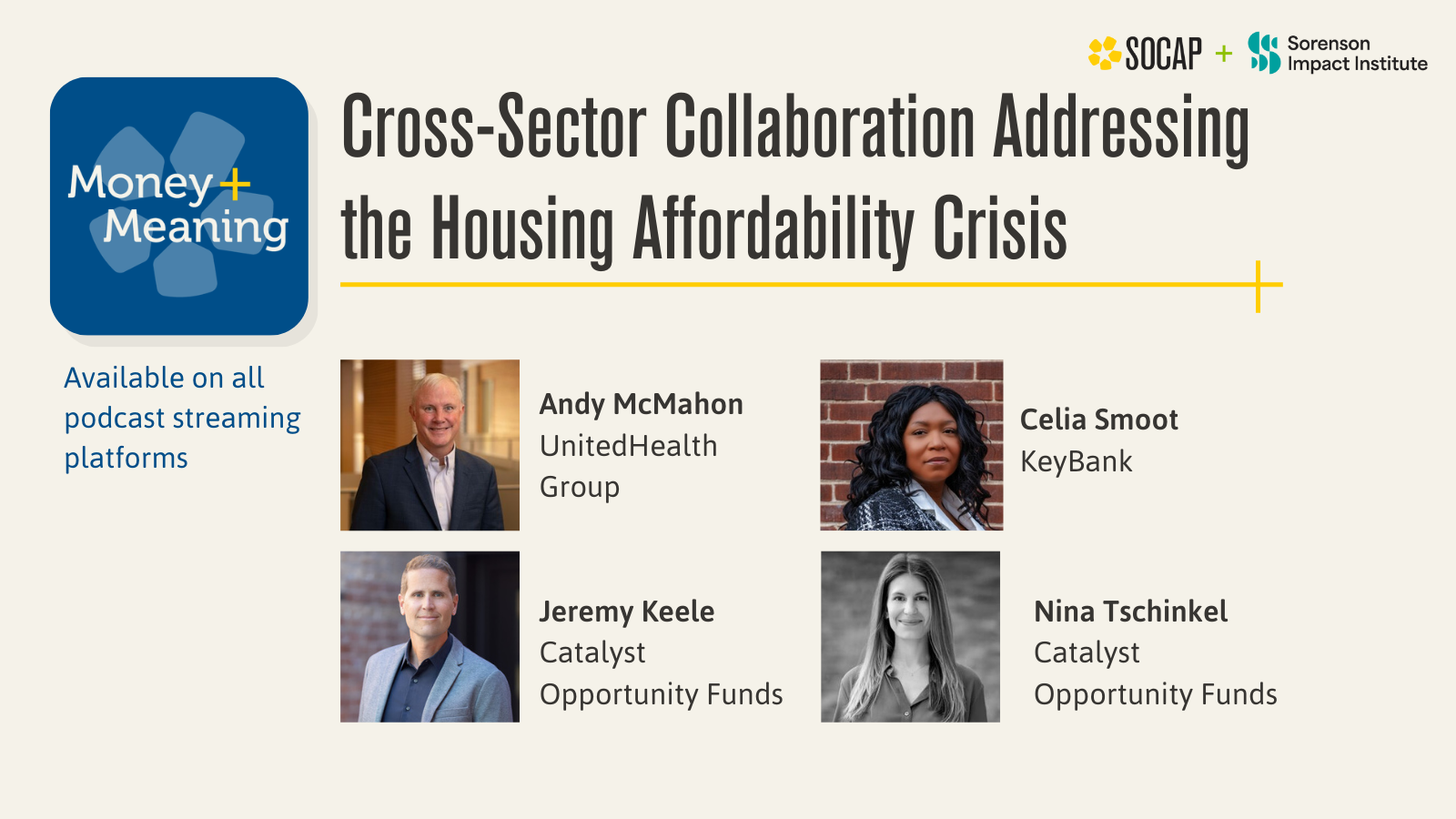Housing costs are taking an increasingly larger bite out of Americans’ incomes, with more than half estimated to be spending more than 30% of their income to keep a roof over their heads. The dearth of affordable housing has a domino effect that includes lengthier work commutes and financial stressors that have consequences for individual and societal health.
A new Money + Meaning episode features leaders in healthcare and finance who discuss how they’re partnering and innovating to address the housing affordability crisis through models that expand the housing stock and provide wraparound services for social and financial impact. Nina Tschinkel of Catalyst Opportunity Funds, who moderated the recorded SOCAP23 conversation, noted that the widespread housing crisis requires solutions that incorporate innovation, cross-sector collaboration, and thought leadership — while also putting people at the forefront. “The best, most effective, most authentic real estate and housing strategies hold community at the center,” she said “They’re done in collaboration with the community, not to the community by an outside group.”
This podcast episode features:
- Andy McMahon, Vice President of Impact Investment of UnitedHealth Group
- Celia Smoot, Senior Vice President of KeyBank
- Jeremy Keele, Managing Partner of Catalyst Opportunity Funds
- Nina Tschinkel, Vice President at Catalyst Opportunity Funds
Jeremy Keele, Co-Founder and Managing Partner at Catalyst Opportunity Funds, said he founded the firm to address the housing affordability crisis, which once had been mainly a coastal issue but now stretches nationwide. “There’s an estimated 5.5-million unit shortfall in this country in terms of getting to kind of a healthy housing where folks that need housing have access to the housing,” he said. “That’s a big number, obviously. The problem with that number is that there’s no sort of silver bullet.”
While federal programs such as the Low-Income Housing Tax Credit are designed to serve a portion of the market, new and innovative solutions are needed to assist middle-income people such as teachers, nurses, police, and others who are being priced out of the communities they serve. Catalyst partners with community-driven developers and tracks progress on affordable housing through a robust impact reporting and measurement framework. “Those folks are building projects with the full support of their community. It’s a very different flavor of development,” he said. “We’re focused on ground-up development of mainly workforce-attainable and also deeply affordable housing units in the country.”
Celia Smoot, Senior Vice President at KeyBank, said helping people is at the heart of her work. As a self-described “houser” with more than 20 years of experience in affordable housing, Smoot has varied experience with financing and regulatory compliance. “We’re still a bank, but we’re a bank that really cares about community,” she said of Cleveland-based KeyBank, which serves numerous Rust Belt states.
Over time, Smoot has seen federal public housing programs fall short of addressing the issues they aim to resolve. Instead, private resources have proven to be a more flexible option for community-focused projects. “The thing that made the difference was approaching it from the sense of being a houser, but also from the sense of thinking differently,” Smoot said. “The creativity is definitely one of the trademarks of our industry.”
As Vice President of Impact Investment with the Health Equity Group at UnitedHealth Group, Andy McMahon takes a holistic view of the impacts of the housing affordability crisis. “From our perspective, having a safe, decent, affordable place to live is essential to being healthy,” he said. “So that’s kind of the cornerstone for us.”
Through initiatives like a $200 million health and housing fund that invests in affordable housing and services, UnitedHealth Group helps address the affordability crunch and broaden access to healthcare services in communities. “We’re thinking about ways to integrate housing and healthcare,” McMahon said. “How can affordable housing developers or public housing agencies work with federally qualified health centers that are probably a stone’s throw away?”
Learn more about these and other innovative ideas to address the housing affordability crisis in the full Money + Meaning podcast.
Don’t miss out! Subscribe to Money + Meaning on Apple Podcasts, Stitcher, TuneIn, Spotify, or anywhere else you find podcasts.
Listen to more episodes of Money + Meaning here.
Money + Meaning is the official podcast of SOCAP. The series aims to expand the conversation around impact investing and strategies to finance and support social change while stimulating innovative and valuable new partnerships across sectors.





